#Hemp protein benefits
Explore tagged Tumblr posts
Photo

#edibles#buy seeds online#health benefits of marijuana#seed oil#weedporn kw%#hemp protein#cbd#marijuana news#ganja smoke
17 notes
·
View notes
Text
How hemp Can Help us Live Healthier Lives!
How hemp Can Help us Live Healthier Lives!
How Hemp Can Help us Live Happier Healthier Lives! Did you know that hemp is an extremely powerful plant with a long history of medicinal and commercial uses? From helping reduce inflammation to providing a sustainable alternative to certain plastics, hemp is quickly becoming one of the most popular plants on the planet. In this article, explore the many benefits of hemp, and how hemp can help…
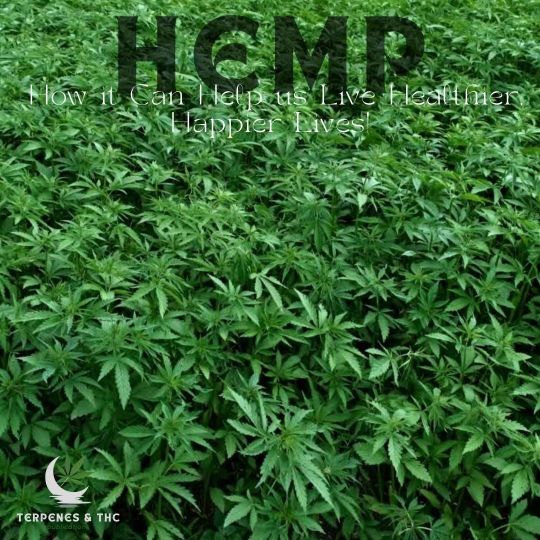
View On WordPress
#benefits of hemp#benefits of hemp oil#benefits of hemp protein#canna#cbd gummies#cbd oil#cbd oil capsules#healing hemp cbd gummies#health and beauty natural oils#health benefits of hemp#hemp cbd oil#hemp hand cream#hemp jacket#hemp oil#hemp seed benefits#holistic depression treatment#is hemp cbd#my youtube studio#natural health and wellness#yt studio
0 notes
Text
Superfoods you should incorporate in your diet:
Superfoods are nutrient-dense foods that are considered beneficial for your health due to their high concentration of vitamins, minerals, antioxidants, and other beneficial compounds.
Combine these superfoods with a variety of other whole foods to ensure you're getting a wide range of nutrients. Also, be mindful of portion sizes and any individual dietary restrictions or allergies you may have.
Berries: Blueberries, strawberries, raspberries, and other berries are rich in antioxidants, fiber, and vitamins.
Leafy greens: Spinach, kale, Swiss chard, and other leafy greens are packed with vitamins, minerals, and fiber. They are low in calories and provide important nutrients like vitamin K, vitamin C, and folate.
Cruciferous vegetables: Broccoli, cauliflower, Brussels sprouts, and cabbage are part of the cruciferous vegetable family. They contain compounds that may help reduce the risk of certain cancers.
Nuts and seeds: Almonds, walnuts, chia seeds, flaxseeds, and hemp seeds are excellent sources of healthy fats, protein, fiber, and various vitamins and minerals.
Fish: Fatty fish like salmon, sardines, and mackerel are rich in omega-3 fatty acids, which are beneficial for heart health and brain function.
Whole grains: Quinoa, brown rice, oats, and whole wheat are examples of whole grains that provide fiber, vitamins, and minerals.
Legumes: Beans, lentils, chickpeas, and other legumes are high in fiber, protein, and various nutrients. They are also a good source of plant-based protein.
Turmeric: This spice contains curcumin, a compound with potent anti-inflammatory and antioxidant properties.
Green tea: Green tea is rich in antioxidants called catechins and is believed to have various health benefits, including improved brain function and a lower risk of certain diseases.
Dark chocolate: Dark chocolate with a high cocoa content (70% or higher) is a source of antioxidants and may have positive effects on heart health and mood.
Avocado: Avocados are rich in healthy fats, fiber, and various vitamins and minerals. They also provide a good source of potassium.
Greek yogurt: Greek yogurt is a protein-rich food that also contains beneficial probiotics, calcium, and vitamin B12.
Sweet potatoes: Sweet potatoes are packed with vitamins, minerals, and fiber. They are an excellent source of beta-carotene, which is converted into vitamin A in the body.
Garlic: Garlic contains sulfur compounds that have been associated with potential health benefits, including immune support and cardiovascular health.
Ginger: Ginger has anti-inflammatory properties and is commonly used to aid digestion and relieve nausea.
Seaweed: Seaweed, such as nori, kelp, and spirulina, is a rich source of minerals like iodine, as well as antioxidants and omega-3 fatty acids.
Pomegranate: Pomegranates are packed with antioxidants and are believed to have anti-inflammatory properties. They are also a good source of vitamin C and fiber.
Cacao: Raw cacao is the purest form of chocolate and is rich in antioxidants, flavonoids, and minerals. It can be enjoyed as nibs, powder, or in dark chocolate form.
Quinoa: Quinoa is a gluten-free grain that provides a complete source of protein, along with fiber, vitamins, and minerals.
Extra virgin olive oil: Olive oil is a healthy fat option, particularly extra virgin olive oil, which is high in monounsaturated fats and antioxidants.
Chia seeds: Chia seeds are a great source of fiber, omega-3 fatty acids, and antioxidants. They can be added to smoothies, yogurt, or used as an egg substitute in recipes.
Beets: Beets are rich in antioxidants and are known for their vibrant color. They also contain nitrates, which have been shown to have beneficial effects on blood pressure and exercise performance.
Matcha: Matcha is a powdered form of green tea and is known for its high concentration of antioxidants. It provides a calm energy boost and can be enjoyed as a tea or added to smoothies and baked goods.
Algae: Algae, such as spirulina and chlorella, are nutrient-dense foods that are rich in protein, vitamins, minerals, and antioxidants. They are often consumed in powdered or supplement form.
Fermented foods: Fermented foods like sauerkraut, kimchi, kefir, and kombucha are rich in beneficial probiotics that support gut health and digestion.
Maca: Maca is a root vegetable native to the Andes and is often consumed in powdered form. It is known for its potential hormone-balancing properties and is commonly used as an adaptogen.
Goji berries: Goji berries are small red berries that are rich in antioxidants, vitamins, and minerals. They can be enjoyed as a snack or added to smoothies and oatmeal.
Hemp seeds: Hemp seeds are a great source of plant-based protein, healthy fats, and minerals like magnesium and iron. They can be sprinkled on salads, yogurt, or blended into smoothies.
Moringa: Moringa is a nutrient-dense plant that is rich in vitamins, minerals, and antioxidants. It is often consumed as a powder or used in tea.
Mushrooms: Certain mushrooms, such as shiitake, reishi, and maitake, have immune-boosting properties and are rich in antioxidants. They can be cooked and added to various dishes.
#health tips#healthy lifestyle#health and wellness#nutrients#healthy life tips#healthy life hacks#healthy diet#level up journey#high value mindset#health is wealth#levelupjourney#glow up tips#glow up#nutrition#healthy living
2K notes
·
View notes
Text
Cannabis: A Multifaceted Plant for a Multitude of Uses
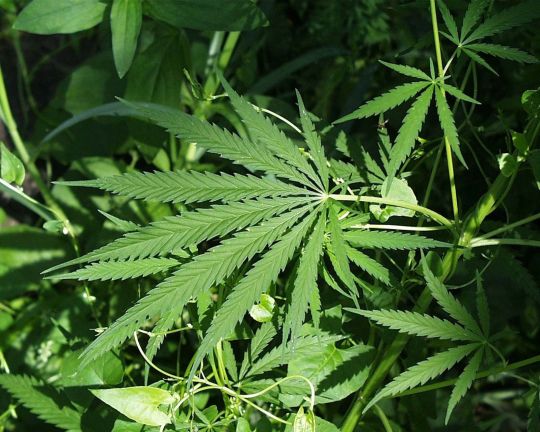
Introduction
Cannabis, a plant that has been a part of human history for thousands of years, is experiencing a resurgence in popularity as its myriad of uses become increasingly recognised. From its strong fibres used in textiles and paper to its nutritional and medicinal properties, cannabis has proven itself to be a truly multipurpose plant. This article will delve into the various aspects of this versatile plant and explore how it has been utilised throughout history and across cultures.
The History of Hemp: A Material with Unmatched Strength
One of the most well-known uses of cannabis is in the production of hemp, a material derived from the plant's strong fibres. These fibres have been used for millennia to create durable cloth, rope, and paper. The Vikings, known for their seafaring prowess, utilised hemp to construct sails for their ships, enabling them to voyage from Scandinavia to Nova Scotia. In the United States, Betsy Ross sewed the first flag from hempen cloth, and the Declaration of Independence was written on hemp paper. Even the now obsolete German currency, Deutsche Mark, were once printed on hemp paper.
The use of hemp extended beyond these applications, as seen in the Netherlands, where windmills were built specifically to crush hemp stalks. This demonstrates the importance of hemp in various industries and highlights the plant's incredible versatility.

Cannabis as a Nutritional Powerhouse
While the strength of its fibres may have initially attracted humans to the cannabis plant, its potential as a food source likely played a significant role in its widespread cultivation. Cannabis seeds, or hempseeds, are packed with essential nutrients such as polyunsaturated fats, essential fatty acids, and proteins. These qualities qualify hempseed as a functional food, meaning it provides health benefits beyond basic nutrition.
For over three thousand years, Asian cultures have utilised hempseed as both a food and a medicine. Despite the prohibition of cannabis products in the United States, hempseed has been allowed for use in food over the last two decades. This highlights the recognition of its nutritional value and potential health benefits.
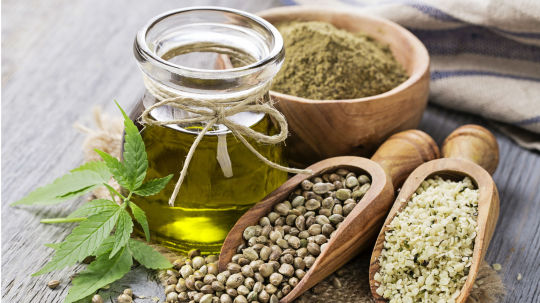
Cannabis Resin: A Source of Medicinal and Psychoactive Compounds
The resin produced by the cannabis plant is another aspect that has garnered significant attention due to its medicinal and psychoactive properties. The compounds found in cannabis resin, such as THC (tetrahydrocannabinol) and CBD (cannabidiol), have been the focus of breeding efforts to increase their production. These efforts have led to the development of various cannabis drug chemotypes around the world, with some cultivars producing only THC, others producing both THC and CBD, and a few expressing propyl THCV (tetrahydrocannabivarin) and/or CBDV (cannabidivarin).
The medicinal uses of cannabis resin have been widely researched, with evidence suggesting its effectiveness in treating conditions such as chronic pain, epilepsy, multiple sclerosis, and more. The psychoactive effects of THC have also led to the recreational use of cannabis, which has sparked debates surrounding its legalisation and regulation.
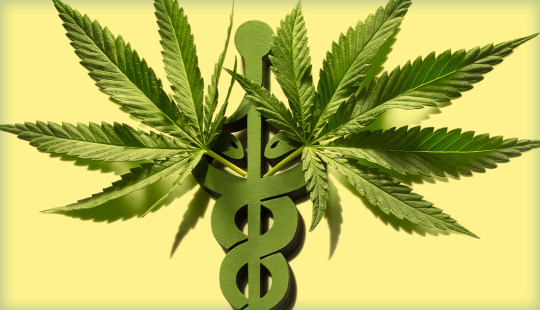
Environmental Benefits of Cannabis Cultivation
In addition to its myriad uses, cannabis cultivation offers several environmental benefits. Hemp plants are known to absorb large amounts of carbon dioxide, making them an effective tool in combating climate change. Furthermore, hemp requires fewer pesticides and herbicides than many other crops, reducing the environmental impact of agriculture.
Cannabis can also be used as a source of biofuel, offering a renewable and eco-friendly alternative to fossil fuels. Additionally, the fast growth rate and low water requirements of hemp make it a sustainable crop, capable of providing resources without causing significant strain on natural resources.
Conclusion
Cannabis is a truly remarkable plant, with applications ranging from textiles and paper to nutrition and medicine. As society continues to recognise its numerous benefits, it is likely that the cultivation and use of cannabis will only continue to grow. By embracing this versatile plant, we can harness its potential to improve our health, industries, and environment for generations to come.
#cannabis#cannabismedicine#cannabishistory#medical cannabis#cbd#feelgreatagain#cbdoil#budandtender#health#endocannabinoidsystem
101 notes
·
View notes
Text
Top Plant-Based Protein Powders for Every Taste and Goal
Finding the right plant-based protein powder can elevate your fitness routine and support your health goals. Whether you're an athlete, fitness enthusiast, or simply looking for a plant-powered boost, choosing a high-quality protein is key. In this guide, we will look at the best plant-based protein powders, including popular brands like Vega, BioSteel, and Sunwarrior. With a variety of taste profiles—from rich chocolate to smooth vanilla—there’s an option to suit every preference and help fuel your day.
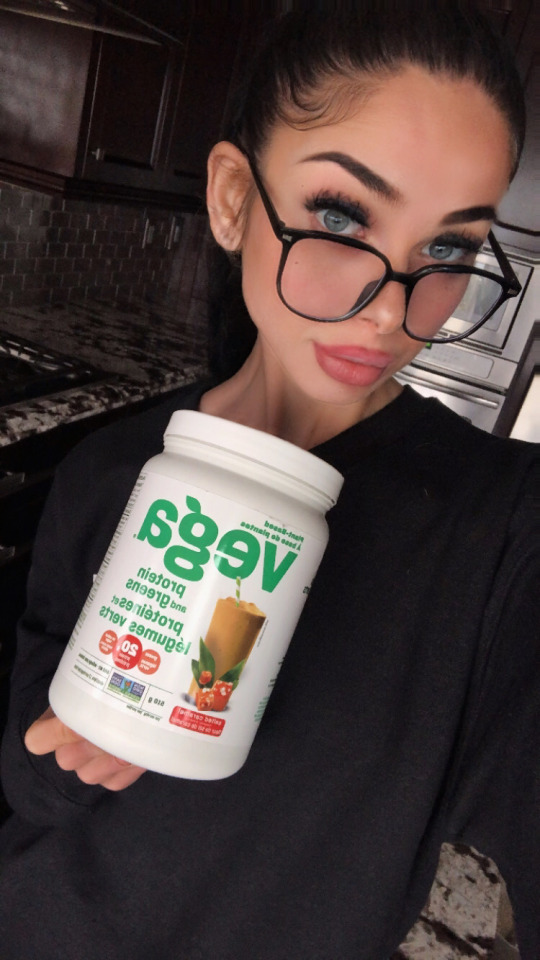
1. Vega Sport Premium Protein
Type: Plant-based, Vegan
Protein Source: Pea protein, pumpkin seed protein, sunflower seed protein, alfalfa protein
Taste: Chocolate, Vanilla, Mocha, Peanut Butter
Key Features: 30g of protein per serving, 6g BCAAs, 5g glutamine, and no artificial flavors or sweeteners.
Ideal For: Athletes, those seeking post-workout recovery.
2. BioSteel Plant-Based Protein
Type: Plant-based, Vegan
Protein Source: Pea protein, brown rice protein
Taste: Chocolate, Vanilla, Ice Cream sandwich, Maple Pancake, Cinnamon Bun
Key Features: 20g of protein per serving, no sugar, and made with non-GMO ingredients. Includes added electrolytes and amino acids.
Ideal For: Hydration, muscle recovery, clean energy.
3. Sunwarrior Warrior Blend
Type: Plant-based, Vegan
Protein Source: Pea protein, hemp protein, goji berries, coconut
Taste: Chocolate, Vanilla, Natural, Berry
Key Features: 27g of protein per serving, high in BCAAs, MCTs, and antioxidants.
Ideal For: Vegan athletes, those looking for a clean, all-in-one blend.
4. Orgain Organic Protein
Type: Plant-based, Vegan
Protein Source: Pea protein, brown rice protein, chia seeds
Taste: Chocolate, Vanilla, Peanut Butter, Cookies & Cream
Key Features: 21g of protein per serving, certified organic, no artificial flavors, sweeteners, or preservatives.
Ideal For: Those seeking a balanced, everyday plant protein powder.
5. KOS Organic Plant Protein
Type: Plant-based, Vegan
Protein Source: Pea protein, organic pumpkin seed protein, organic flaxseed, quinoa
Taste: Chocolate, Vanilla, Chocolate Mint
Key Features: 20g of protein per serving, organic, 9 essential amino acids, digestive enzymes.
Ideal For: People looking for a nutrient-dense, organic option with digestive support.
6. Garden of Life Raw Organic Protein
Type: Plant-based, Vegan
Protein Source: Pea protein, brown rice protein, chia seeds, and sprouted grains
Taste: Vanilla, Chocolate, Unflavored
Key Features: 22g of protein per serving, 44 superfoods, probiotics, and digestive enzymes.
Ideal For: Those who want a clean, whole-food-based protein with added digestive benefits.
7. Nuzest Clean Lean Protein
Type: Plant-based, Vegan
Protein Source: Pea protein isolate
Taste: Chocolate, Vanilla, Coffee, Strawberry
Key Features: 20g of protein per serving, 100% pea protein isolate, no artificial ingredients.
Ideal For: Those who prefer a pure, minimalistic protein source with low carbs.
8. Vital Proteins Collagen Peptides (Plant-based alternative)
Type: Plant-based, Vegan alternative to collagen
Protein Source: Pea protein, rice protein
Taste: Unflavored
Key Features: Focuses on joint and skin health, while providing protein for muscle recovery.
Ideal For: Vegan consumers looking for a collagen-boosting alternative.

#plantbased#protein#healthy eating#healthy living#health#energy#today#wellness#nutrition#healthy diet#weight loss diet#low cal diet
11 notes
·
View notes
Note
Hey! In response to your recipes post, I was wondering if you had any recommendations for low histamine protein options. I have MCAS mostly controlled by meds and would like to do better about a low histamine diet. When I tried initially, I lost too much weight because I couldn’t get enough food, protein in particular, following the SIGHI diet list. Eating took so much coordination and I just didn’t have the time or energy. Any suggestions would be appreciated!
Assuming you are following this SIGHI list.
Before I go too far with this, if you are losing weight, you may want to consider aggressively focusing on fat. So if you can tolerate dairy, that means you want cream, sweet cream butter, or fresh cheese (like cream cheese) in every meal and snack. And I'm talking probably drinking cream or half-n-half as a beverage. Cheese and cream/half-n-half have a lot of protein in them too. If you are sensitive to additives, consider getting these directly from a dairy if that is possible for you. Whole milk also tends to have fewer additives and may be a more sustainable option.
If you can't tolerate dairy or the additives that come with it, canned whole-fat coconut milk may be a good replacement due to it's high calorie and fat content.
If you can't do coconut or dairy, consider finding an oil that you can tolerate and doing "oil shots" (drinking 15-30ml amounts of the oil as a snack several times per day). You'll need to combine this with a protein source (see below) to get the same benefit as above.
Pumpkin seeds (shelled), chia (freshly ground), and hemp seeds (hemp hearts) contain a lot of protein, fat, and calories. You can make up the rest of your protein needs here through whole grains like brown rice (if tolerated) and amaranth, millet, and oats (assuming these are tolerated).
If you can do meat, this is also a great option, though I know a lot of people avoiding histamine have trouble with store-bought meat due to handling concerns. If you can get meat frozen directly from a farm this is usually much better in the consistently-low histamine space.
21 notes
·
View notes
Text
EAT HEALTHY BE HEALTHY
SEEDS
Seeds are tiny powerhouses packed with nutrients and offer numerous health benefits. Here are some of the top seeds you might consider adding to your diet:
Flaxseeds: Rich in fiber and omega-3 fatty acids, flaxseeds can help reduce cholesterol levels, improve heart health, and may even lower the risk of certain cancers
Chia Seeds: These seeds are high in fiber, protein, and omega-3 fats. They can help with weight management, improve digestion, and stabilize blood sugar levels
Hemp Seeds: A great source of plant-based protein, hemp seeds also contain healthy fats and essential amino acids. They can support heart health and reduce inflammation
Pumpkin Seeds: Packed with antioxidants, magnesium, and zinc, pumpkin seeds can boost immune function, improve heart health, and support prostate health
Sunflower Seeds: These seeds are rich in vitamin E, magnesium, and selenium. They can help reduce inflammation, support heart health, and improve skin health
Sesame Seeds: High in calcium, magnesium, and iron, sesame seeds can support bone health, reduce blood pressure, and improve digestion
Incorporating a variety of seeds into your diet can provide a wide range of health benefits.
2 notes
·
View notes
Text
Food Rich In Protein

Boost Your Health with High-Protein Foods
Are you looking to enhance your fitness and overall health? Incorporating high-protein foods into your diet is a great way to start. Protein is essential for muscle growth, repair, and overall body function. This article will guide you through some of the best high-protein foods to include in your diet, ensuring you get the maximum benefits.
Why High-Protein Foods Matter
Proteins are the building blocks of the body, crucial for repairing tissues, making enzymes, and supporting overall growth. A diet rich in protein can help with weight management, reduce hunger, and boost metabolism. Whether you're an athlete, a fitness enthusiast, or simply looking to improve your diet, high-protein foods are essential.
Top High-Protein Foods to Include
Lean Meats: Chicken breast, turkey, and lean cuts of beef are excellent sources of protein, offering essential amino acids required for muscle repair and growth.
Fish: Salmon, tuna, and mackerel not only provide high protein but are also rich in omega-3 fatty acids, promoting heart health.
Eggs: A versatile and affordable source of protein, eggs also provide essential vitamins and minerals.
Dairy Products: Greek yogurt, cottage cheese, and milk are great for a protein boost, aiding in muscle repair and bone health.
Legumes: Lentils, chickpeas, and black beans are fantastic plant-based protein sources, high in fiber and essential nutrients.
Nuts and Seeds: Almonds, chia seeds, and hemp seeds provide protein and healthy fats, perfect for snacks and adding to meals.
Whole Grains: Quinoa, brown rice, and farro not only offer protein but also fiber, aiding in digestion and prolonged energy levels.
Incorporating High-Protein Foods
Including these high-protein foods in your meals is simple. Start your day with a protein-packed breakfast like Greek yogurt with chia seeds. For lunch, a quinoa salad with chickpeas can be both satisfying and nutritious. Dinner could be a serving of grilled salmon with a side of lentils.
Conclusion
Enhancing your diet with high-protein foods is a smart and effective way to support your fitness goals and overall health. By incorporating a variety of these foods into your daily meals, you can ensure your body gets the protein it needs to thrive. For more tips and insights on maintaining a healthy diet, visit the PROMiXX Academy blog.
3 notes
·
View notes
Text
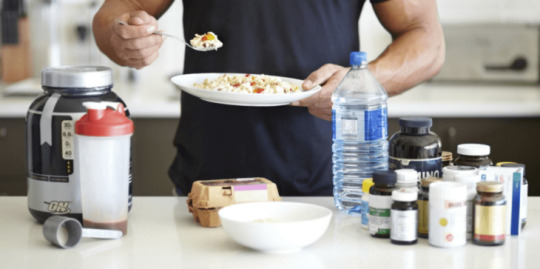
Boost Your Fitness and Performance with the Right Supplements
In the pursuit of improved fitness and performance, many athletes and fitness enthusiasts turn to supplements to give them an edge. While a balanced diet should always be the foundation, certain supplements can complement your training regimen and help you reach your goals faster. Let’s explore some of the most effective supplements for enhancing fitness and performance.
1. Protein Powders
Protein is essential for muscle repair and growth, making it a cornerstone of any fitness program. Protein powders, such as whey, casein, and plant-based options like pea or hemp protein, offer a convenient way to increase your protein intake. They can be consumed as shakes or added to smoothies, providing a quick and easy source of high-quality protein.
2. Creatine
Creatine is one of the most researched supplements for improving strength and power. It works by increasing the body’s stores of phosphocreatine, which helps regenerate adenosine triphosphate (ATP), the primary energy currency of cells. This can lead to improved performance during high-intensity activities like weightlifting and sprinting.
3. Branched-Chain Amino Acids (BCAAs)
BCAAs, including leucine, isoleucine, and valine, are essential amino acids that play a crucial role in muscle protein synthesis. Supplementing with BCAAs can help reduce muscle breakdown during exercise, enhance recovery, and promote muscle growth.
4. Beta-Alanine
Beta-alanine is a non-essential amino acid that combines with histidine to form carnosine, a compound that helps buffer acid in muscles during high-intensity exercise. By increasing muscle carnosine levels, beta-alanine supplementation may delay fatigue and improve endurance during activities like sprinting and interval training.
5. Caffeine
Caffeine is a well-known stimulant that can enhance performance in various ways. It increases alertness, reduces perceived exertion, and can improve endurance by stimulating the release of adrenaline and mobilizing fatty acids for energy. Caffeine can be consumed in supplement form or obtained from sources like coffee and tea.
6. Omega-3 Fatty Acids
Omega-3 fatty acids, found in fish oil supplements, have anti-inflammatory properties that can benefit athletes by reducing exercise-induced inflammation and promoting faster recovery. Additionally, omega-3s support cardiovascular health, which is crucial for overall fitness and performance.
7. Vitamin D
Vitamin D plays a vital role in bone health, muscle function, and immune function, making it important for athletes and active individuals. Many people have suboptimal levels of vitamin D, especially those who live in northern latitudes or spend limited time outdoors. Supplementing with vitamin D can help ensure adequate levels for optimal performance and overall health.
8. Electrolytes
Electrolytes such as sodium, potassium, and magnesium are essential for hydration, muscle function, and nerve signaling. During intense exercise, especially in hot conditions, electrolyte losses through sweat can impair performance and increase the risk of cramping. Electrolyte supplements or sports drinks can help replenish these crucial minerals and maintain electrolyte balance.
9. Nitric Oxide Boosters
Nitric oxide (NO) is a molecule that dilates blood vessels, increasing blood flow to muscles and improving nutrient and oxygen delivery. Supplements containing ingredients like citrulline and beetroot extract can enhance NO production, leading to better endurance and performance during workouts.
Conclusion
Supplements can be valuable tools for enhancing fitness and performance when used appropriately alongside a well-rounded diet and training program. However, it’s essential to choose high-quality supplements, stay within recommended dosages, and consult with a healthcare professional or nutritionist if you have any concerns or underlying health conditions. With the right combination of supplements and dedication to your fitness goals, you can maximize your potential and achieve the results you desire.
#fitness motivation#health#fitness#supplements#gymlife#workout#health and wellness#healthy lifestyle#wellness#gym#diet#healthcare#health tips#healthy living#weight loss#nutrition#healthy diet
4 notes
·
View notes
Photo

#drug effects#dope#stonernation#sativa high#kush strainskw%#hemp protein#getlifted#benefits of marijuana#kush seeds
7 notes
·
View notes
Text
The Health Benefits of Hemp Products

Hemp products have gained recognition for their numerous health benefits, making them a fantastic addition to your wellness routine. Hemp seeds, oil, and protein offer a variety of advantages:
Nutrient-Rich: Hemp seeds are packed with essential fatty acids like omega-3 and omega-6, which are crucial for heart health and reducing inflammation.
Digestive Health: High in fiber, hemp seeds support healthy digestion and regular bowel movements.
Protein Power: Hemp protein is highly digestible and provides all nine essential amino acids, making it an excellent plant-based protein source.
Skin Benefits: Hemp oil contains gamma-linolenic acid (GLA), which can help improve skin hydration and reduce symptoms of eczema and acne.
These benefits highlight why incorporating hemp products into your diet can support overall health and well-being.
Read more: Health Great Things About Hemp Products
5 notes
·
View notes
Text
Superfoods To Boost Your Diet and Health 🍽️🌿
📌 Discover the power of superfoods to enhance your diet and overall health. These nutrient foods offer extraordinary health benefits if included in your meals. ⬇️
1️⃣ Chia Seeds
⬇️ Benefits:
High in omega-3 fatty acids. Rich in fiber and antioxidants. It helps regulate blood sugar levels.
⬇️ Tips:
Add to smoothies or yogurt. Mix into oatmeal or puddings.
2️⃣ Maca Root
⬇️ Benefits:
Boosts energy and stamina. Enhances mood and memory. Balances hormones.
⬇️ Tips:
Blend into smoothies or juices. Add to cookies or muffins. Stir into hot drinks for a nutritional boost.
3️⃣ Baobab Fruit
⬇️ Benefits:
High in vitamin C and antioxidants. Supports digestive health. Has anti-inflammatory properties.
⬇️ Tips:
Sprinkle on cereals or oatmeal. Mix into water or smoothies. Use in sauces and dressings.
4️⃣ Spirulina
⬇️ Benefits:
Complete protein source. Rich in B vitamins and iron. Detoxifies heavy metals.
⬇️ Tips:
Add to green smoothies or juices. Mix into salad dressings. Add to energy bars or bites.
5️⃣ Hemp Seeds
⬇️ Benefits:
Excellent source of plant-based protein. Contains essential fatty acids. Supports heart health.
⬇️ Tips:
Sprinkle on salads or soups. Blend into smoothies or shakes. Use in baking recipes.
➡️ Adding these superfoods to your diet will provide numerous health benefits and help you achieve your goals. Experiment with these foods and find what works best for you! 👊🏽
📌 P.S. Share your favorite superfood recipe or tip down below! For more nutrition insights, recipes, and news, consider joining my newsletter 📬📬 https://marcomarconii.ck.page/18360dce95
2 notes
·
View notes
Text
Vegan Products for Beginners: Tips, Brands, and Nutritional Insights
Introduction to Vegan Products
Hey there! Have you ever wondered what all the buzz about Vegan Products is? Well, you’re in the right place. Let’s dive into the world of vegan products, which are items that do not contain any animal-derived ingredients. Veganism isn’t just a diet; it’s a lifestyle choice that prioritizes compassion and sustainability. Whether you’re a curious newbie or a seasoned vegan, this guide will walk you through everything you need to know about vegan products.
History of Veganism
Early Beginnings
The roots of veganism can be traced back to ancient civilizations that advocated for non-violence towards animals. However, the modern vegan movement began in 1944 when Donald Watson coined the term “vegan” and co-founded the Vegan Society in the UK. This marked a significant shift in how people perceived and practiced plant-based living.
Evolution Over the Decades
Since the 1940s, veganism has evolved from a niche dietary choice to a mainstream movement. The rise of environmental awareness, animal rights activism, and health consciousness has propelled veganism into the spotlight, leading to a surge in demand for vegan products.
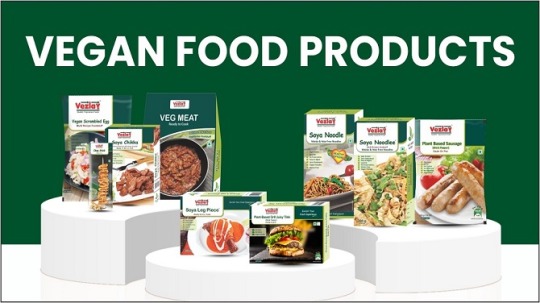
Types of Vegan Products
Food and Beverages
Plant-based Proteins
Gone are the days when vegans struggled to find protein sources. Today, plant-based proteins like tofu, tempeh, and seitan offer delicious and nutritious alternatives to meat. Brands like Beyond Meat and Impossible Foods have revolutionized the market with their meat substitutes that mimic the taste and texture of traditional meat.
Dairy Alternatives
Whether it’s almond milk in your coffee or cashew cheese on your pizza, dairy alternatives have made it easier than ever to enjoy creamy, delicious products without the guilt. Oatly and Daiya are just two of the many brands offering fantastic dairy-free options.
Personal Care Items
Vegan Skincare
Looking for cruelty-free beauty products? Vegan skincare brands like The Body Shop and Herbivore Botanicals ensure that you can pamper your skin without harming animals. These products often feature natural, plant-based ingredients that are gentle on your skin and the environment.
Haircare Products
Vegan haircare is another booming industry. Brands like Lush offer shampoos, conditioners, and styling products that are free from animal-derived ingredients and harsh chemicals.
Clothing and Accessories
Vegan Leather
Say goodbye to leather made from animal hides. Vegan leather, often made from materials like polyurethane or innovative alternatives like pineapple leaves (Piñatex), offers a stylish and ethical option for fashion lovers. Brands like Matt & Nat lead the way in chic, sustainable vegan accessories.
Sustainable Fabrics
Sustainable fabrics such as organic cotton, bamboo, and hemp are making waves in the vegan clothing industry. These materials are not only eco-friendly but also incredibly comfortable and stylish.
Household Products
Cleaning Supplies
Cleaning your home can be ethical too! Vegan cleaning supplies from brands like Seventh Generation and Method ensure that no animals are harmed in the process of keeping your space spotless.
Home Decor
Vegan home decor is an emerging trend, with products like cruelty-free candles, plant-based paints, and sustainable furniture gaining popularity among conscious consumers.
Benefits of Using Vegan Products
Health Benefits
Nutritional Advantages
Vegan products often pack a nutritional punch. Plant-based diets are rich in vitamins, minerals, and antioxidants, which can help boost your immune system and overall health.
Reduced Risk of Chronic Diseases
Studies have shown that a vegan diet can reduce the risk of chronic diseases such as heart disease, diabetes, and certain cancers. By choosing vegan products, you’re not just being kind to animals but also to your body.
Environmental Benefits
Lower Carbon Footprint
Animal agriculture is a significant contributor to greenhouse gas emissions. By opting for vegan products, you can significantly reduce your carbon footprint and help combat climate change.
Conservation of Resources
Producing plant-based foods requires fewer resources like water and land compared to animal agriculture. This means that choosing vegan products helps conserve vital resources and promotes sustainability.
Ethical Benefits
Animal Welfare
One of the primary motivations for many vegans is animal welfare. By using vegan products, you contribute to reducing the demand for animal exploitation and cruelty.
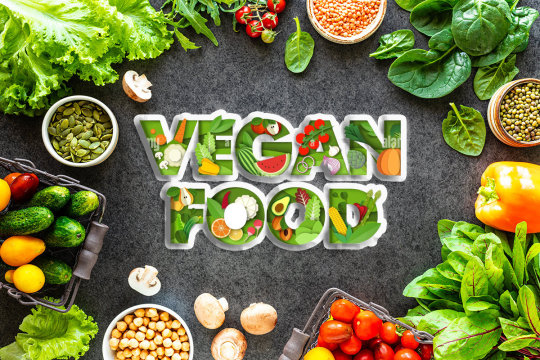
Human Rights Considerations
The vegan movement also intersects with human rights issues, advocating for fair labor practices and the ethical treatment of workers in the supply chain.
Challenges of Vegan Products
Accessibility and Availability
While vegan products are becoming more mainstream, they may still be hard to find in some areas. Rural or less-developed regions might have limited options compared to urban centers.
Price Differences
Vegan products can sometimes be more expensive than their non-vegan counterparts. This price disparity can be attributed to various factors, including production costs and market demand.
Mislabeling and Greenwashing
Not all products labeled as “vegan” are truly vegan. Some companies engage in greenwashing, using misleading claims to appear more eco-friendly than they are. It’s essential to research and verify product labels to ensure authenticity.
How to Identify Authentic Vegan Products
Reading Labels
Become a label detective! Look for clear indications that a product is vegan. Ingredients lists and allergy information can provide clues about the product’s contents.
Recognizing Certifications
Vegan Society Trademark
The Vegan Society Trademark is a reliable certification that ensures a product is free from animal ingredients and has not been tested on animals.
PETA-Approved Vegan
PETA’s certification is another trusted mark that guarantees the ethical standards of vegan products.
Top Vegan Food Brands
Beyond Meat
Beyond Meat is famous for its plant-based burgers that taste incredibly similar to beef. Their products are a fantastic way to enjoy familiar flavors without compromising on your values.
Oatly
Oatly offers a range of oat-based dairy alternatives, from milk to ice cream. Their products are delicious, sustainable, and perfect for those who are lactose intolerant or vegan.
Tofurky
Tofurky provides a variety of plant-based meats that are perfect for everything from sandwiches to holiday feasts. Their products are a staple in many vegan households.
Daiya
Daiya specializes in dairy-free cheeses that melt, stretch, and taste like the real thing. Their products are great for anyone craving cheesy goodness without the dairy.
Top Vegan Personal Care Brands
The Body Shop
The Body Shop is a well-known brand offering a wide range of vegan and cruelty-free skincare, haircare, and makeup products.
Lush
Lush is renowned for its handmade, ethical cosmetics. Their vegan products are fresh, fragrant, and perfect for pampering yourself.
Herbivore Botanicals
Herbivore Botanicals combines natural ingredients with luxury skincare. Their products are vegan, cruelty-free, and packaged in eco-friendly materials.
Top Vegan Clothing Brands
Stella McCartney
Stella McCartney is a high-fashion brand committed to sustainability. They offer stylish, cruelty-free clothing and accessories made from innovative materials.
Matt & Nat
Matt & Nat are pioneers in vegan leather goods. Their bags, wallets, and accessories are not only chic but also environmentally friendly.
Vaute Couture
Vaute Couture focuses on creating high-quality vegan fashion. Their products are designed with both ethics and aesthetics in mind.
Incorporating Vegan Products into Your Lifestyle
Transitioning Tips
Making the switch to vegan products doesn’t have to be daunting. Start small by gradually replacing non-vegan items with their vegan counterparts.
Meal Planning with Vegan Foods
Meal planning can simplify your transition. Explore vegan recipes, plan your meals for the week, and make a shopping list to ensure you have all the ingredients you need.
DIY Vegan Personal Care Recipes
Why not try making your own vegan personal care products? There are plenty of DIY recipes online for everything from face masks to shampoo.
Debunking Myths About Vegan Products
Nutritional Deficiencies
One common myth is that vegan diets lack essential nutrients. However, with careful planning, you can get all the nutrients you need from plant-based sources.
Taste and Texture Issues
Many people believe that vegan products don’t taste as good or have a strange texture. Thanks to advancements in food technology, this is no longer the case. Many vegan products taste just as good, if not better, than their non-vegan counterparts.
Limited Options
The notion that veganism limits your options is outdated. The market is brimming with a variety of vegan products that cater to every need and preference.
Future Trends in Vegan Products
Technological Advancements
Technology is playing a crucial role in the vegan industry. Innovations like lab-grown meat and advanced plant-based proteins are set to revolutionize the market.
Emerging Markets
Veganism is gaining traction worldwide, with emerging markets in Asia, Africa, and Latin America showing significant growth in vegan product demand.
Innovations in Food Science
Food science continues to push the boundaries, creating vegan products that are more delicious and nutritious than ever before. From cultured dairy to plant-based seafood, the future looks bright.
Vegan Products and the Economy
Market Growth
The vegan market is experiencing exponential growth. As more consumers embrace veganism, the demand for vegan products continues to rise.
Job Creation
The growth of the vegan market has led to job creation in various sectors, from agriculture to manufacturing to retail.
Economic Impact
The shift towards veganism has a positive economic impact, promoting sustainable practices and ethical business models that benefit society as a whole.
How to Support the Vegan Movement
Advocacy and Awareness
Spread the word! Share information about the benefits of veganism and vegan products with your friends and family.
Supporting Vegan Businesses
Put your money where your mouth is by supporting vegan businesses. This helps promote ethical practices and encourages more companies to adopt cruelty-free methods.
Personal Actions and Lifestyle Changes
Every small change counts. Whether it’s adopting Meatless Mondays or switching to vegan skincare, your actions can make a big difference.
Conclusion
To wrap it up, Vegan Food Products offer a plethora of benefits, from health and environmental advantages to ethical considerations. While there are some challenges, the growing market and increasing accessibility make it easier than ever to embrace a vegan lifestyle. So why not give it a try? Start incorporating vegan products into your daily routine and be part of the change for a better world.
3 notes
·
View notes
Text
Easy low-effort meal, overnight oats edition:
Making this recipe requires very little physical energy and very few decisions to be made, so I’ve been able to make it even on bad symptom days and/or in depressive episodes. Oats have a lot of health benefits that especially apply to fibromyalgia issues, including: regulating blood sugar levels, improving gut health and digestion, improving energy levels, providing plenty of fiber and nutrients, and they’re not inflammatory & gluten free. Same goes for the add-ins tbh, which also have a good amount of omegas and protein. You can personalize it based on what sounds good to you or what you have.
Tools:
Big container with lid (I use my 7 cup pyrex)
Spatula for mixing
1/2 cup measuring cup
Ingredients:
1 1/2 cups quick oats (I use Robin Hood minute oats)
1/4 cup ground flax
1/4 cup chia seeds
1/4 cup hemp hearts
Pinch salt
Sprinkle of cinnamon to taste (optional, but supposedly anti-inflammatory)
1 cup greek yogurt (I like vanilla extra creamy, but mix it up sometimes. I always get extra creamy though bc I like the thickness, and it has the most protein.)
1 cup oat milk (or whatever milk situation you have.)
1/4 cup maple syrup (or honey, and can use more to taste.)
Method:
Put all the dry ingredients into your container. I just eyeball the 1/4 cup by using half of the 1/2 cup so I only dirty one thing.
Give it a stir with the spatula until it looks evenly mixed.
Use the spatula to scoop yourself a cup of yogurt (again, I use two of the same 1/2 and the same spatula.)
Add in the oat milk.
Add in the maple syrup.
Stir it all up until it’s evenly incorporated. It’ll be thick, more like a pudding. And that’s it lol put it in the fridge.
To serve:
Wait at least four hours, but this will keep like a week if you don’t finish it before that.
It’ll be even thicker after sitting with those chia seeds. I think of it almost like an oatmeal concentrate lol - I scoop out however much I want into a little bowl, add in more oat milk, and mush it out to create a more classic oatmeal consistency. This stretches it out so you don’t have to make it as often.
If you want, you can also add extra maple syrup/honey to your individual portion, and/or a little sprinkle of cinnamon.
Again feel free to customize if you want to add anything in like nuts, dry fruit, flavors, etc but also it’s great like this if you don’t wanna think about it!
Any day you manage to feed yourself is a good day, and you’re doing a great job! <3
#fibro flare#fibro things#fibromyalgia#fibrolife#mental health#chronic fatigue#chronic illness#self care#recipe#cooking#easy recipes#oatmeal#overnight oats#depression meal#low effort#low energy#chronically ill#actually disabled
17 notes
·
View notes
Text
WHY IS HEMP MILK THE BETTER ALTERNATIVE FOR YOU?

As consumer awareness continues to grow, an increasing number of individuals are making the switch from traditional cow's milk to plant-based alternatives. This shift is driven by multiple factors, including concerns about the health implications of consuming cow's milk and the rising incidence of lactose intolerance among the population. It is also amazing to ponder why humans are the only species on Earth that consumes milk from another species, hinting at the need for a closer examination of the nutritional and ethical aspects of this practice. In this context, the spotlight is on hemp milk, a highly nutritious and protein-rich plant-based alternative, which is becoming increasingly popular for its health benefits and versatility in various culinary applications.
To read more about the blog, please click here :- Why is hemp milk the better alternative for you?
#exercise#recipes#hempmyths#hempproducts#cannabiscommunity#hemp nutrition#cannabis#medicinal cannabis#hemplife
7 notes
·
View notes